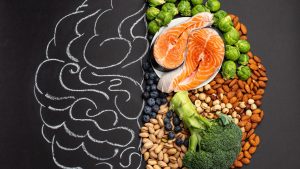At Community Kitchen, we pay extra attention to your gut health—because we believe wellness begins from within.
Gut Health: The Hidden Key to Mental Health, Mood, and Energy

In today’s hyper-connected world, conversations around mental health have become more open and widespread—and rightly so. However, one of the most crucial yet overlooked aspects of mental well-being is gut health. While most people associate the gut solely with digestion, it plays a far more significant role in regulating mood, energy levels, and even emotional stability.
The Gut-Brain Connection

The gut and the brain are intricately linked through what scientists call the gut-brain axis—a communication highway that connects your digestive tract with your central nervous system. This connection allows the gut to send signals to the brain and vice versa, influencing everything from how we feel to how we think.
In fact, about 90% of the body’s serotonin, the “feel-good” neurotransmitter, is produced in the gut. A balanced and healthy gut microbiome supports optimal serotonin production, reduces inflammation, and improves nutrient absorption—all of which contribute to better mental clarity, emotional balance, and sustained energy throughout the day.
How Fast Food Culture Has Disrupted Gut Health

Despite the vital importance of gut health, modern dietary habits are working against it. The rise of fast food, processed meals, sugary beverages, and artificial additives has led to widespread damage to gut microbiota—the diverse community of bacteria that keeps our digestive and immune systems running smoothly.
This damage doesn’t just stay in the gut. It spills over into our mental and emotional states. Many individuals, especially young people, report experiencing:
Unexplained mood swings
Persistent fatigue
Feelings of anxiety and low motivation
Trouble concentrating or sleeping
These symptoms are often addressed through medication or lifestyle advice—but rarely is gut health discussed as a potential root cause.
Social Media Influence and the Younger Generation
The younger generation is growing up in a digital world where trendy food marketing and influencer culture dominate their choices. Social media platforms are flooded with advertisements and “what I eat in a day” videos that prioritise aesthetics, convenience, or viral appeal over nutritional value.

This has led to a worrying disconnection from traditional food wisdom—rich in fiber, fermented foods, seasonal fruits, and vegetables—that support gut health. As a result, many young individuals are unaware that their daily food choices may be directly affecting their mood, focus, and energy levels.
What You Can Do to Support Your Gut—and Your Mind
The good news is, the gut is incredibly responsive to change. Small, consistent shifts in diet and lifestyle can restore balance and unlock better mental health. Here are a few ways to get started:

Eat whole foods: Focus on fruits, vegetables, whole grains, legumes, and nuts. These feed the good bacteria in your gut.
Include fermented foods: Yogurt, kefir, kimchi, sauerkraut, and kombucha are excellent for gut flora.
Limit processed and sugary foods: These promote harmful bacteria and increase inflammation.
Stay hydrated: Water supports digestion and nutrient absorption.
Move regularly: Physical activity stimulates gut motility and brain function.
Prioritise sleep: Gut bacteria follow circadian rhythms, so good sleep promotes their health too.
Conclusion: Heal the Gut, Heal the Mind

We can no longer afford to ignore the connection between what we eat and how we feel. Our gut is more than a digestive system—it’s a second brain. By nurturing it, we’re not just improving digestion; we’re building the foundation for better mood, sharper focus, and a more balanced life.


